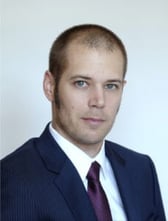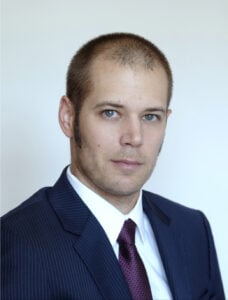Our “Meet the Expert” series introduces you to our team of experts around the world. This “behind the curtain” view will help you get to know who we are on a professional and personal level, and highlight how our colleagues work together on our higher purpose to improve patient health and safety throughout the complete product lifecycle.
 Meet the Expert: Raphael Richarz, Consultant QA/QP
Meet the Expert: Raphael Richarz, Consultant QA/QP
What do you like best about working with clients?
It makes me so happy when I solve a challenge for my customers and, at the same time, expand my knowledge by the lessons learned. It's a win-win for everyone.
Tell us about a day in the life of a consultant.
After breakfast with my kids, I start the day focusing prior to my first meeting. I usually work a "9 to 5" schedule, but as my availability is primarily dependent on the needs of the customer, I am free to plan my hours as fits. In the daily scrum, I present the client what has been done so far and we agree on the to-do list for the day, and update the burn-down chart as required. In general, I can select deliverables from the backlog freely, in some cases I need to follow the customer’s prioritization, though.
If no further meetings are scheduled for the day, I mute all notifications except priority contacts and focus 100% on one task. I only reach out to the client if I lack relevant information or when they wish to get frequent ad-interim reports. At times though, like when resources are not yet available or a situation suddenly has changed, a deliverable cannot be implemented. In this case we need to agree on a new plan.
After lunch, I like to devote the afternoon to more creative aspects of my projects, such as drafting presentations, illustrating documents, and fine-tuning the layouts. Townhalls and in-house training courses often take place in the late afternoon, which renders this timeframe preferable for learning, like reading current FDA warning letters. ProPharma Group really cares about its employees and offers a wide range of education and learning services. After 5:30, I finish the day with following-up on emails and entering my hours. Then, I shut down my laptop and spend the evening with my family & friends.
What is a current trend you’re seeing in the industry and how does it impact our clients and patients?
During my years in radiochemical research, I experienced with joy the great rise of interest in radiotherapeutics and the benefits of positron emission tomography (PET) by some big pharma companies. I truly believe that adding innovative radiation therapy to our toolbox for fighting life-threatening diseases like prostate cancer will enable novel ways of treatment for patients.
Though there is clearly a lot of potential, nuclear research and the corresponding field of medicine has long played a minor role in Germany, as radiopharmaceuticals are subject to particularly strict laws and regulations. Only a few research groups are really digging deep here and try to explore their molecules beyond the preclinical phase. In general, the risk adverseness in Europe is a particular challenge for any startup if your idea hasn’t been proven yet. It is common to see good ideas remain unexploited due to lack of funding and lack of knowledge about regulatory requirements, despite the huge interest in the German scientific community on promoting spin-offs and startups in the area of natural science. But speed is key to success as you want to prove your concept as fast as possible to attract investors.
I think ProPharma Group can significantly help pharmaceutical entrepreneurs and scientific startups in navigating the regulatory jungle and providing the necessary knowledge, net- and paperwork as our colleagues cover the whole spectrum of expertise relevant for startups and early phase clinical trials.
How do you support ProPharma Group’s mission and higher purpose of improving the health and safety of patients?
GxP regulations in the pharmaceutical industry can be complex and tough. I support our customers in unravelling the essentials and helping make their life-saving products available to patients. From start-ups to well-stablished companies, the German QA team at ProPharma Group provides workable solutions to all clients.
What is one lesson you’ve learned in this industry that has most helped you?
There are many regulations in the pharma business, however, usually no one will come to you and tell you how to put them into living practice. You often have to be resourceful to identify the best solution. Sometimes you need to touch base with the competent authorities or fall back to your network when it comes to complex situations. So, building bridges and being open with the authorities is what you need to if you want to survive in this business.
Tell us a little bit about yourself outside of work.
I always wanted to be either a chemist or do something with metals. Since having made the former my profession, working with metal eventually became my hobby. My work at times is quite abstract and takes place on a meta-level, but I sometimes need to create something you can actually touch and put in your hand. Casting and forging metal is just a great way to rearrange atoms into something useful.



